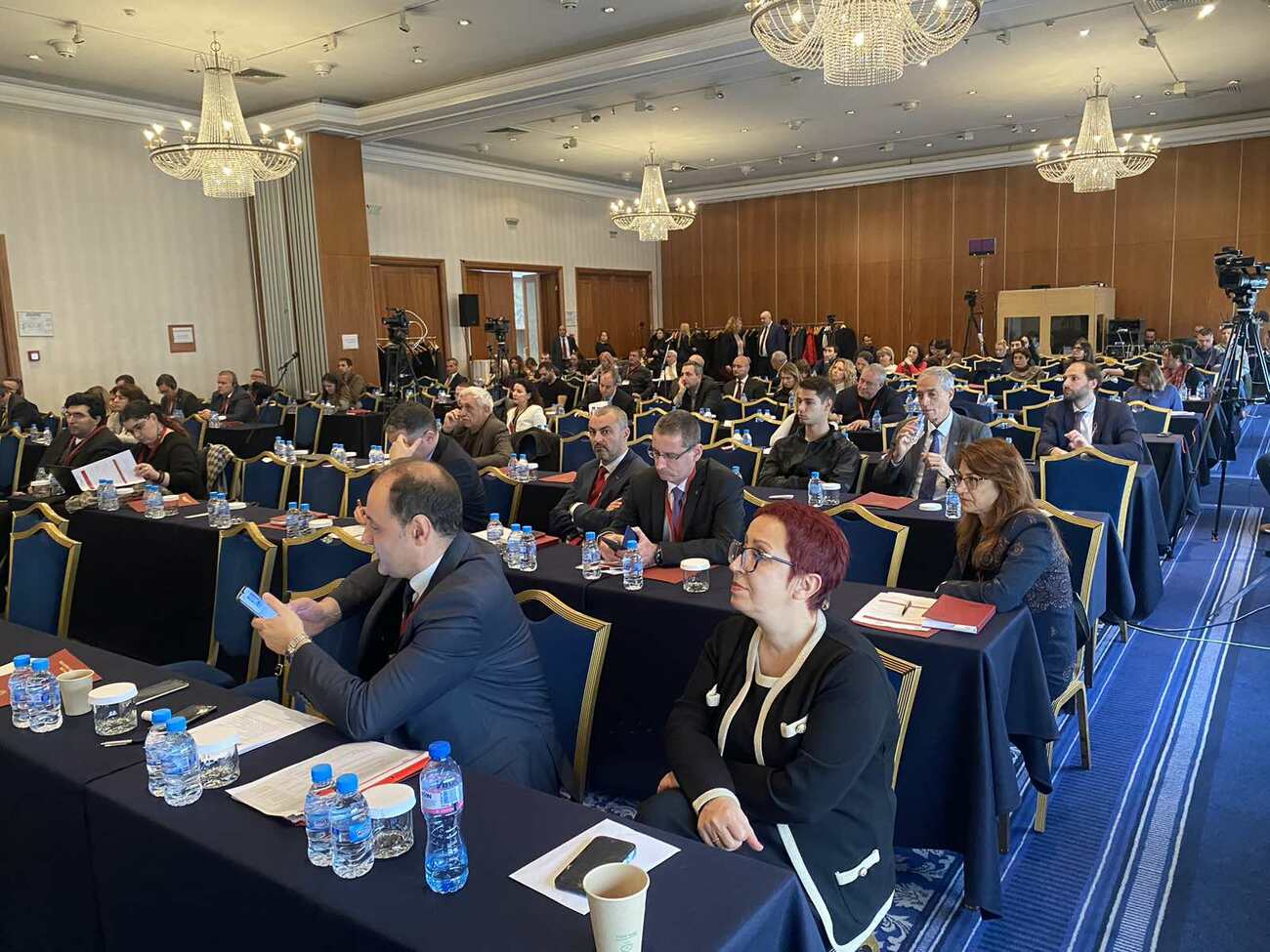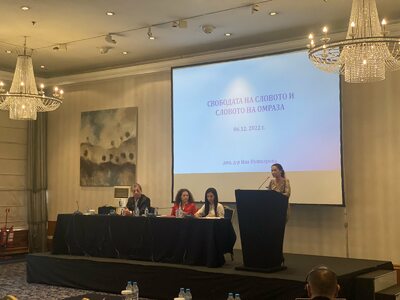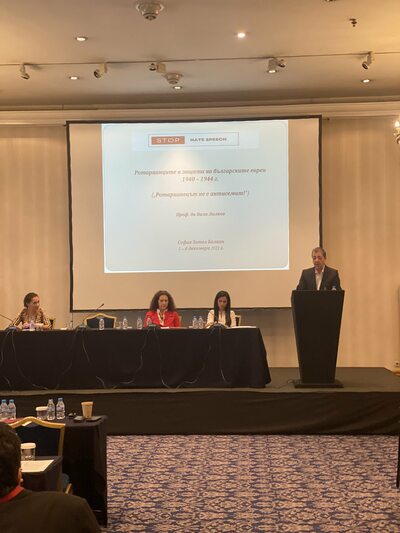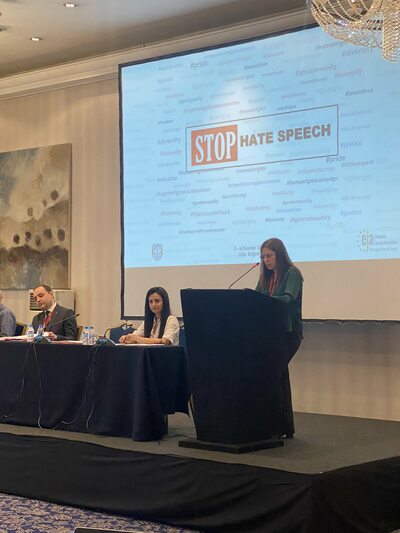
"The forum we held opened a window of opportunity. Whether we will go through this window and realize the possibilities of reducing the intensity of hate speech, for more good, for a better world and a better society, depends only on us." With these words, Prosecutor General of the Republic of Bulgaria, Ivan Geshev, closed the STOP HATE SPEECH International Conference, which was held on December 5-6 in Sofia and gathered in one place over 130 representatives of the NGOs, spiritual leaders and senior magistrates from Europe.
The Prosecutor General indicated that the conference exceeded all his expectations. "As Prosecutor General, the various aspects of hate speech and crimes with a discriminatory motive are a huge problem. They are a problem for us as a nation, because we ourselves hate each other in our daily lives, and I see how this process deepens from year to year," he pointed out.
On the second day of the forum, December 6, 2022, a debate took place within the third thematic panel - "Crimes with a discriminatory motive - the need for measures guaranteeing the rights of representatives of minority groups". It was attended by representatives of the Bulgarian Helsinki Committee, the Bilitis Foundation, a prosecutor from the Supreme Cassation Prosecutor’s Office, the Jewish Organization Shalom, activists for the rights of the LGBTI community, the Center for Inter-Ethnic Dialogue and Tolerance "Amalipe", a Pulitzer Prize-winning journalists and representatives of the academic community.
Milena Kotseva, Director of Procedural Representation of Republic of Bulgaria before the European Courts of Human Rights Directorate (ECHR) at the Ministry of Justice made a brief statement of the case-law related to the guarantee of freedom of expression. She summarized several decisions on cases of incitement to hatred, violence and hate speech against people of different religious views, justification of war crimes, terrorism and hatred based on sexual orientation.
Sava Petrov, prosecutor at the Supreme Cassation Prosecutor's Office, presented a topic related to measures of recognition and distinction of discriminatory motive when conducting a criminal prosecution. He pointed out that hate crimes and hate speech are not mutually exclusive concepts, although they are interrelated, and cannot be punished equally. "There must be a consistent, predictable policy in the fight against hate crimes, and the Prosecutor's Office has not been focusing on this since yesterday," said prosecutor Petrov
"What lessons have we learned?" asked prosecutor Sava Petrov. And he answered: "The crime of hate is a crime of a message not only to a specific victim, but also to all bearers of the relevant trait. Therefore, the institutional reaction is also a message. We must make fellow prosecutors to be not more literate about hate crimes, but more sensitive to them," said the magistrate from the Supreme Cassation Prosecutor’s Office. He also emphasized the need for a unified mechanism for the collection of data on such type of crimes, which would benefit the activity of the judicial system in the fight against hate crimes.
Radoslav Stoyanov, representative of Bulgarian Helsinki Committee, explained the mechanism by which the aggressor selects his victim. "This is done on the basis of some indication - the group to which the victim belongs or it is chosen in such a way as to exploit some of its vulnerabilities," Radoslav Stoyanov said, highlighting the cases of sexist violence (based on gender) as a form of hate crime.
The Chairman of Amalipe Center for Interethnic Dialogue and Tolerance Deyan Kolev said that young and educated Roma continue to face the problem of rejection and hatred. I would like to congratulate the colleagues from the Prosecutor's Office of the Republic of Bulgaria for the initiative to organize the STOP HATE SPEECH Conference.” I hope that this initiative will be followed by many other countries," Kolev pointed out. He paid special attention to the negative impact of discriminatory political statements, which, in his opinion, have not prosecuted actively enough. "Freedom of speech is not an excuse for hate speech," said the Chairman of Amalipe Center for Interеthnic Dialogue and Tolerance.
Yulia Dandolova from the organization of Jews in Bulgaria "Shalom" thanked the Prosecutor's Office of the Republic of Bulgaria for the courage to organize a STOP HATE SPEECH Conference and to unite people from different religions and social groups. She emphasized how important it is to develop sensitivity of children to hate speech, sharing her concerns about violence at school
"Rotarians in defense of Bulgarian Jews 1940 - 1944" - was the topic presented by Prof. Dr. Vili Lilkov within the framework of the forum. "When, after the Second World War, Europe was flooded of hatred and barbarism, something unique happened. Bulgaria saves its Jews. I have chosen as an example the behavior of the group of Rotarians, who, together with the Jews, are outlawed in Bulgaria. Why? Because it is little known and shows how leaders should behave in such a difficult situation," said Prof. Lilkov. He added: "Everyone today says - where is the Prosecutor's Office, where is the court." If we rely on the Prosecution and the court to solve the problems when it comes to hate speech and hate crimes, then we have a big problem. Before the Prosecutor's Office and the court stands society, the media and the leaders".
Pulitzer Prize winner and Fellow of the Royal Geographical Society Marisa Roth noted the importance of teaching people tolerance and coexistence
The scientific point of view on the issue of boundaries of free speech was presented by Asoc. Prof. Iva Pushkarova, lecturer at the Faculty of Law at Sofia University "St. Kliment Ohridski". "Crime motivated by discrimination has many manifestations. Yes, freedom of speech is a basic human right and the ECHR links it up with democratic foundations of a modern democratic society. But not everything you want to say needs to be said. Freedom of speech is not unlimited, unlike freedom of expression of belief," she pointed out.
Assoc. Prof. Pushkarova stated that the challenges in the field are related to boundary between freedom of speech and hostile speech, although it has always been considered and fell within the limits of absolute prohibitions in the field of human rights. "Words are particularly important and we must take them into consideration if we want to develop," said the expert.
Assoc. Prof. Rumiana Hristidi from Sofia University "St. Kliment Ohridski" concluded the panel by noting that for the first time an institution like the Prosecutor's Office organized such a unique forum with the participation of legal practitioners, non-governmental organizations and civil society. "Hate speech is a part of man, of his millennial history. But what we can do is to strengthen the balance; the struggle is continuous", noted the university professor. Hate speech awakens negative ideas, therefore it is easiest to exceed the boundary from words to actions", she emphasized and expressed her wishes for the forum to launch even more fruitful and practical results "in the fight against evil."


